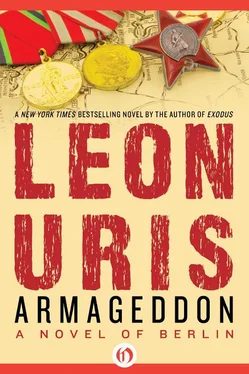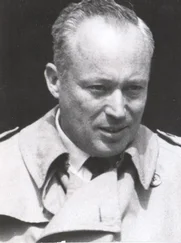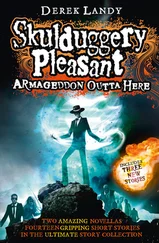Armageddon - Leon Uris
Здесь есть возможность читать онлайн «Armageddon - Leon Uris» весь текст электронной книги совершенно бесплатно (целиком полную версию без сокращений). В некоторых случаях можно слушать аудио, скачать через торрент в формате fb2 и присутствует краткое содержание. Жанр: Старинная литература, на английском языке. Описание произведения, (предисловие) а так же отзывы посетителей доступны на портале библиотеки ЛибКат.
- Название:Leon Uris
- Автор:
- Жанр:
- Год:неизвестен
- ISBN:нет данных
- Рейтинг книги:4 / 5. Голосов: 1
-
Избранное:Добавить в избранное
- Отзывы:
-
Ваша оценка:
- 80
- 1
- 2
- 3
- 4
- 5
Leon Uris: краткое содержание, описание и аннотация
Предлагаем к чтению аннотацию, описание, краткое содержание или предисловие (зависит от того, что написал сам автор книги «Leon Uris»). Если вы не нашли необходимую информацию о книге — напишите в комментариях, мы постараемся отыскать её.
Leon Uris — читать онлайн бесплатно полную книгу (весь текст) целиком
Ниже представлен текст книги, разбитый по страницам. Система сохранения места последней прочитанной страницы, позволяет с удобством читать онлайн бесплатно книгу «Leon Uris», без необходимости каждый раз заново искать на чём Вы остановились. Поставьте закладку, и сможете в любой момент перейти на страницу, на которой закончили чтение.
Интервал:
Закладка:
“I was told what to manufacture, what my quota was. I took the labor that was assigned to me.”
“You and Hermann Goering were flyers together in the First World War. Did you or did you not use your personal friendship to obtain contracts for airplane motors and V-2 rockets?”
“As a businessman I am no different from any businessman anywhere in using my contacts ...”
“And taking the Nazi Blood Order Honor.”
“I was not in a position to turn down a Nazi decoration. It would have been suicide for me to refuse.”
“So your brother Kurt was used as the Nazi front for the Von Romstein family and conveniently committed suicide.”
“My brother made the decision on his own. I believe your concept of justice excludes guilt by association.”
“Let’s examine the association. Brother number one, mayor. Brother number two, chancellor. Brother number three, Nazi Gauleiter. Let me ask you, Count. In your capacity as chancellor and benefactor what did you do about the smashing of the windows of Jewish shops, the burning of their synagogues, the stealing of their fortunes, beatings in the streets, murder at Schwabenwald?”
Ludwig stiffened and fumed. The Jews! Always the Jews! What did this idiot know about Jews. Yes, as chancellor I kept them from over-running the staff of the hospital and kept their numbers proper in the Medical College. I guarded against their filthy business ethics. Neither he nor his father nor his father’s father ever had a Jew in Castle Romstein. It was a matter of family honor. There were those few distasteful civic occasions when it was unavoidable to meet a Jew ... but, the Jews did not run the theaters and newspapers and banks as they did in Vienna and Berlin.
“I never condoned,” the count said with slow deliberateness, “Hitler’s program for the Jewish question. We Germans had many Jews of whom we were proud. There must have been a dozen German Jewish Nobel Prize winners. A close examination of my tenure in public life will prove I never went outside the law in the treatment of Jews.”
“You didn’t have to go outside the law. The Nuremberg Laws let you do anything you wished. Is there any crime on the books you can’t excuse or justify, Count?”
“It is well and good for you to hammer questions at me and demand explanations,” Von Romstein burst back in anger, “but I was in no more of a position to rule upon either the legality or the inhumanity of the law than you are of your laws. I am a German citizen and these were the laws and times of my country. Surely, the good Major is aware of the existence of unjust laws against the Negroes in America and surely the Major knows that Negroes are looked upon as subhumans by a large segment of the American people. We Germans did not invent race hatred.”
“We Americans did not invent death factories. That is an exclusive German innovation!”
“If ... if we could perhaps discuss this on a sane level. I can neither explain nor justify with you shouting at me and I should like you to know my position.”
Sean’s anger abated slowly. He told himself to gain control. “Go ahead ...”
“May I sit down?”
Sean nodded. The count asked for permission to smoke. He drew a long puff wondering where to begin. The man opposite him was filled with righteous wrath.
“You must remember, Major O’Sullivan,” Von Romstein opened, “that America has never committed acts for which she has had to answer later. Your behavior has never been judged by a conqueror. You have never had to explain. When you are not involved in the day-to-day living and temper of a times it is easy to ask questions as a casual observer.”
“I’m not a casual observer. The Germans have killed two of my brothers.”
“And I have lost a son. I do not wish to offend you, Major, but you must realize that the House of Von Romstein has borne the responsibility of this Landkreis since long before Columbus discovered America.”
Sean was impressed by the opening gambit.
“I am not going to question your intelligence by defending feudalism,” Von Romstein continued, “but it is a system that we inherited because of the limited opportunities of the land. Feudalism, the landowner and the overseer, breeds a type of tradition and family responsibility foreign to American life. As time passed we outgrew an agrarian economy and we were forced to industrialize or perish. You see, Germany was the last power in Europe to become industrial. When my grandfather made the great transition, it was a mere fifty years ago.
“Once the Machine Works was built, Rombaden tripled in size. Under an agrarian economy life was quite simple. The population was such that everyone had enough to eat. Products made in small factories where traditional arts had been practiced for generations, but ... with heavy industry the District of Romstein, as was the case in most of Germany, was simply unable to produce enough food. This set off a cycle of dependence upon manufactured products to trade in order to import food.
“Germany is a small country with an enormous population. We do not have room to explore or expand. We do not have the natural, God-given assets of America. Germany is poor in natural wealth. Its great asset is the energy and ingenuity of the people. Things here must be orderly. Ambitions must be limited. The factory here must produce in order to maintain enough jobs. If the factory closes, Rombaden does not eat. Unlike America, we have no magic food surplus to draw upon.
“I inherited the Romstein family responsibility at the end of the First World War. I shall not debate with you the good or the evil of the Versailles Treaty. The Allies say Germany did not get enough punishment. We Germans felt it was too severe. From a practical standpoint, the Versailles Treaty closed down the Machine Works and we were not permitted to produce. The people of this Landkreis and in all of Germany were hungry and frightened and there was no work.”
Graf Ludwig Von Romstein snuffed out his cigarette. He was immersed in his memories; the sea of his own words had caught him up. He drifted toward the window that looked down on the City Hall Square, that place of so much history.
“Nor will I argue either the good or the bad of the Weimar Republic. It was our first experiment with so-called democracy ... and it failed. It was too weak to achieve the needs of the day.
“So, now that this war is ending you say to me ... how could this have happened? I’ll tell you, Major O’Sullivan. If you were a German citizen of Rombaden in 1924 you would have known. There was starvation and no work. Inflation was so bad a wagonload of marks could not buy a loaf of bread.
“And the worst of it was that we Germans had been stripped of our pride and our dignity. Pride is a German strength and a German weakness. Other people can live without it ... the Chinese ... the Latin Americans ... the Slavs. But a German cannot.” He pointed to his dueling scar. “This is a nonsensical pride to show my courage as a young man. Well, Hitler came and spoke to us of jobs and returning German dignity. In that square below and in other squares he staged his pageantry and a hurt lower class devoured it.
“How did the rest of us feel about this ridiculous man? We were coming to a choice in Romstein Landkreis. We either went with Hitler or to the Communists. There was no strong middle ground in the Weimar Republic. So we tried to make a temporary arrangement with Hitler in order to get people working, recover our senses, beat back the Communists, restore our dignity.
“I say in all candor to you, Major O’Sullivan, that in the days that lie ahead you Americans will discover that we were not wrong about the Communists. They may be your allies now, but you shall learn hard lessons about them.
Читать дальшеИнтервал:
Закладка:
Похожие книги на «Leon Uris»
Представляем Вашему вниманию похожие книги на «Leon Uris» списком для выбора. Мы отобрали схожую по названию и смыслу литературу в надежде предоставить читателям больше вариантов отыскать новые, интересные, ещё непрочитанные произведения.
Обсуждение, отзывы о книге «Leon Uris» и просто собственные мнения читателей. Оставьте ваши комментарии, напишите, что Вы думаете о произведении, его смысле или главных героях. Укажите что конкретно понравилось, а что нет, и почему Вы так считаете.











